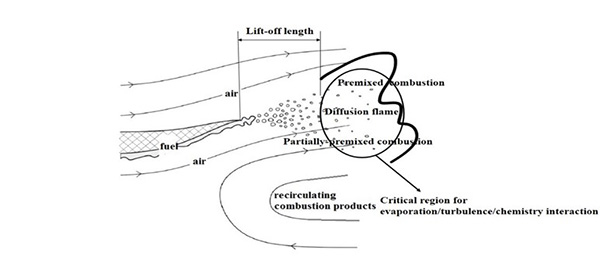The National Natural Science Foundation of China (NSFC) has announced the 2017 list of funded “Fundamental research on turbulent combustion for engine” projects. University of Michigan-Shanghai Jiao Tong University Joint Institute (UM-SJTU JI) Professor Chien-Pin Chen’s “Multiphase spray flamelet based turbulent spray combustion research” is one of the winners.
 Critical region for evaporation, turbulence and chemistry interaction in the head of combustor
Critical region for evaporation, turbulence and chemistry interaction in the head of combustor
In gas turbine technology for aircraft industry, key performance metrics are efficiency, fuel flexibility, low emissions and good operational characteristics. These issues often set the overall operational limits of the aircraft or entire plant. To understand the controlling mechanisms associated with the complex multicomponent spray combustion, it is essential to understand the detailed interaction among droplet evaporation, turbulence and combustion chemistry. Recent research found preferential evaporation and heterogeneous mixing of oil and gas inside a fuel droplet are the main reason for flame instability.
Combustion instability, which may aggregate engine vibration and increase heat load, is one of the biggest challenges for the development of aero engines. Although spray combustion model considering liquid fuel evaporation has been developed in recent years, there is no numerical study of two-phase multicomponent spray combustion at home and abroad. Professor’s Chen proposed to develop a novel composite spray flamelet model accounting gas cooling, droplet evaporation, ignition and flame extinction based on Flamelet Generated Manifold (FGM) tabulation, and couple with CFD to do high fidelity simulation of surrogate fuel spray combustion. Validated models and proposed turbulent spray combustion studies will highly enhance capabilities in resolving critical combustion instability related issues, such as blowout and re-ignition, associated with new generation gas turbine combustors.
This project will focus on following areas:
1. Further development of unified RP-3 surrogate fuel
This part of work will based on surrogate fuel model developed by Prof. Chen’s group, and incorporate new chemical kinetics mechanism derived from the current NSFC projects, to further improve predictive capability of RP-3 surrogate fuel.
Related publications:
[1] Chen X, Khani E, Chen C P. A unified jet fuel surrogate for droplet evaporation and ignition[J]. Fuel, 2016, 182:284-291.
[2] Su M, Chen C P. Heating and evaporation of a new gasoline surrogate fuel: A discrete multicomponent modeling study[J]. Fuel, 2015, 161(12):215-221.
2. Development of spray evaporation and combustion model for multicomponent fuel
This work will based on FGM method to develop multicomponent turbulent spray combustion model, and coupled with multicomponent spray evaporation model developed by Prof. Chen’s group to study the flow and mixing mechanism of spray-evaporation-combustion.
Related publications:
[1] Chen, C. P. and Zhao, Bolin, “Numerical Investigation of Multicomponent Fuel Liquid Length and Vapor Penetration in High Pressure Hot Gas Flows,” 2nd Frontiers in Computational Physics: Energy Sciences, 3-5 June 2015, Zurich, Switzerland; journal paper to appear in Journal of Shanghai Jiao Tong University (Science), 2018.
[2] Abianeh O S, Chen C P, Mahalingam S. Numerical modeling of multi-component fuel spray evaporation process[J]. International Journal of Heat & Mass Transfer, 2014, 69(1):44-53.
[3] Abianeh O S, Chen C P. A discrete multicomponent fuel evaporation model with liquid turbulence effects[J]. International Journal of Heat & Mass Transfer, 2012, 55(23-24):6897-6907.
3. Simulation of aero engine combustion chamber
This modeling work will be conducted under the real aero engine operation conditions, to investigate the fuel effect on spray combustion characteristics and the issues of flameout and re-ignition. The boundary widening method will also be studied.
Professor Chen’s group now want to recruit a postdoctoral fellow to assist professor Chen in conducting research on this project. Interested students please contact to chienpin.chen@sjtu.edu.cn.
Brief Bio of Chien-Pin Chen:
 Chien-Pin Chen is currently the Associate Dean for the Academic Affairs in JI. He earned a doctoral degree in Chemical Engineering from Michigan State University in December 1983. Before joining JI, he served as Chairman and professor at the Department of Chemical and Materials Engineering, University of Alabama in Huntsville, USA.
Chien-Pin Chen is currently the Associate Dean for the Academic Affairs in JI. He earned a doctoral degree in Chemical Engineering from Michigan State University in December 1983. Before joining JI, he served as Chairman and professor at the Department of Chemical and Materials Engineering, University of Alabama in Huntsville, USA.
Professor Chen’s research interests include multiphase flow, spray combustion, turbulence models, computational fluid dynamics, and cutting edge biochip and aerodynamic optics. His professional memberships include ASME Fellow, Honorary Fellow of the Australian Society of High Energy Materials, AIAA Associate Fellow, Senior Member of American Institute of Chemical Engineering (AIChE), Member of AIChE International Education Committee, ABET Program Evaluator.
Chen has won NASA Technical Innovator Awards, AIAA Outstanding Young Aerospace Engineer of the Year award, NASA Group Achievement Award, and National Academy of Sciences/National Research Council resident research award. He has served as a reviewer for the National Science Foundation and other projects, branch chairman of a number of international conferences, and editorial board member of many internationally renowned journals.





